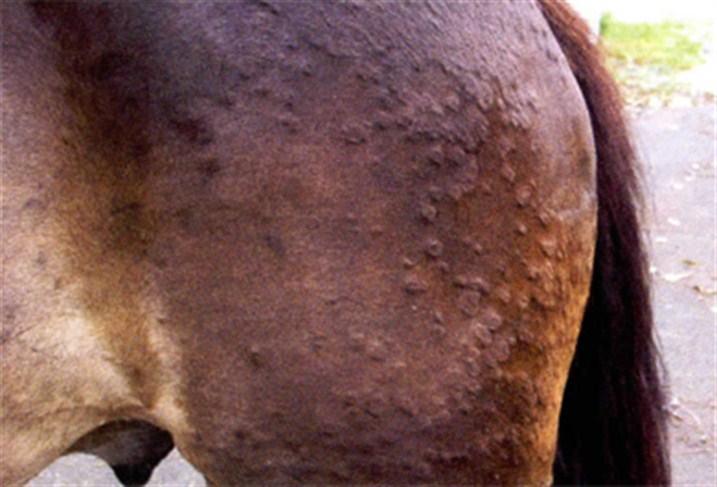By Chuck Maker, DVM
Summer is in full-swing and with the lovely weather comes an increase in bugs. Bites or stings can cause itching or painful swelling at the site, and they may become prone to infection. To keep your horse comfortable, it is important to watch for signs of bites or stings that may need treatment.
One type of reaction to bug bites is known as insect hypersensitivity. This is a form of allergic reaction to insects such as flies, mosquitoes, and biting midges, and is frequently seen during the warm weather months. Common signs of this include scratching, biting, and rubbing of the skin, sometimes with loss of hair on the body, mane and tail. Some horses may be so severely affected that they may have weight loss or show behavioral changes such as restlessness and irritability. Genetics are believed to play a role in insect hypersensitivity, thus certain animals are more likely to be affected than others. Due to the allergic nature of this disease, treatment is typically lifelong and aimed at insect control. Ways to do this include bug spray, fly sheets, frequent manure removal, eliminating standing water, and bringing your horse inside during peak insect feeding times. Large, strong box fans can also help prevent bites from insect species that are weak fliers.
Spider bites and bee stings can also cause problems and result in hot, painful swellings. Bee stings leave behind a stinger which may need removal. Bites or stings to the face can cause your horse to go off feed and stop drinking water due to the pain. Concurrent infection at the site of a bite or sting, may need treatment with antibiotics.
If you notice any suspicious swellings or changes in your horse’s behavior after suspected insect bite or sting, please contact your veterinarian or Alpine Animal Hospital at 970.963.2371. Bites and stings are not only uncomfortable, but may also result in more serious conditions that require treatment. Summer is a wonderful time to enjoy the great outdoors with your horse, but always be mindful of what may be bugging them.

